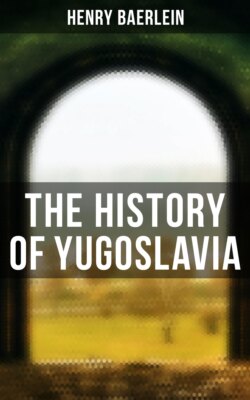Читать книгу The History of Yugoslavia - Henry Baerlein - Страница 77
На сайте Литреса книга снята с продажи.
STROSSMAYER
ОглавлениеTo such a degree did the Austrian Government neglect its duties that, ten years ago, Croatia and Slavonia were short of at least one thousand school buildings and twelve hundred teachers. Bishop Strossmayer, coming from a family[43] which had settled at the sprawling town of Osiek, in Slavonia, did what he could. His Yugoslav Academy at Zagreb, the Zagreb University and the Society for studying the history of the Yugoslavs are but a few of the national institutions to which he devoted the princely revenues of Djakovo. From there this most remarkable man worked for the intellectual advancement of all the Southern Slavs; he subsidized the brothers Miladinoff who made the first collection of Bulgarian folk-songs (and who, on account of this forbidden subject, were both subsequently strangled at Constantinople); he paid for the education of young students no matter from what Yugoslav country they came; when Rački, the well-known Croat historian, was persecuted by the Government and living in misery, Strossmayer begged him to come to Djakovo, and Rački was his closest friend for many years; he built a large gallery at Zagreb and filled it with pictures, sacred and profane, and was as ready to assist a young artist in Istria as in Macedonia. It may be that he caused a circular to be read in the Croatian churches which referred to the Orthodox as "lost sheep," but he never used a method other than by prayer and the example of his life to cause them to forsake their fold; to him the forcible conversions by the Turks were as abhorrent as a system that was used in Bačka, where a whole village near Sombor was ennobled—but not those who afterwards came to live there—for having joined the Roman Church. He was himself no blind follower of the Vatican; and when he went with a very princely retinue—in part the weakness of his humble origin—to Rome in order to explain why he was unable to subscribe to the dogma of Papal Infallibility, he ravished his audience with a marvellous Latin oration, for he spoke many modern languages but was most thoroughly at home in Latin. Often in conversation he passed from one language to another, in search of what would best express his meaning, and frequently he would have recourse to Latin. He became reconciled to the dogma and it was due to the hostility of Magyar potentates that he remained for more than fifty years the Bishop of Djakovo, was not promoted to Zagreb nor made a cardinal. His fervent and statesmanlike views can be seen in his correspondence[44] with Gladstone. His head, like Gladstone's, caused one not to notice that the rest of the body was unimpressive; they had the same brilliance of eye. This man who worked continuously for the Southern Slavs could not be always a persona grata to Francis Joseph. Two remarks of the Emperor's are handed down, but that one may be a legend which, with the preface that Strossmayer was the only man to whom the Emperor was ever rude, says that Francis Joseph accounted for some proceedings of the bishop, as head of the National party in Croatia, by telling him that he must have been drunk—and, overtaken by remorse, making him an "Excellency" on the following day. Yet that story is certainly true which recounts how in 1881 the Emperor at Belovar said to him that he would sooner be an unimportant German Duke than Emperor of all the Slavs.
